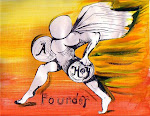As is my wont, I'm generally keen to understand the etymology of the words, particularly the key words, that I use. I think I may as well give you a quick definition of what the word "democracy" actually means, because for most people, I imagine, the concept of democracy is inevitably connected with the political system under which we (those in the western "liberal democracies") live. There's nothing liberal or democratic about them, of course, and there will no doubt be those who would argue that everybody understands that, and what am I moaning about?
Well, perhaps I'm just a pedant, or perhaps there's something more to this laziness with language. That is, while our own lives have no real connection with democratic principles, it's important that we can kid ourselves that they do. More importantly, it's valuable for those in power to pretend that we have some sort of control over our lives, when key decisions impacting our wellbeing are made without any reference to us. If that is the case, and it most certainly is, because I don't remember the last time any cunt of a politician asked me my opinion (on the contrary, as you will discover shortly), then whose interests are those decisions being made in?
Anyway, on that note, let's just define democracy for ourselves. According to etymonline, democracy is derived from an Ancient Greek word "demokratia", which was created by the joining of demos "common people," (originally "district"), and kratos "rule, strength". "The strength of the common people"? It may be debateable as to whether democracy ever existed in Ancient Greece, particularly as that empire practised slavery, but are you beginning to see where my grievance lies? Perhaps the knowledge that I am PNG, as far as my MP is concerned provides a clue. It seems that unless I am willing to discuss issues affecting me in party political terms, then I have no right to be anything other disenfranchised. Politicians, or political parties, then, if we are to extrapolate from my experience, are only interested in discussing their own realities - like most people, I suppose. In short, my MP no more represents my interests in Westminster than he flies in the air unaided.
So, if we don't have democracy, in its truest (ie, original) sense, then what do we have? Perhaps we should look at the alternatives, and then perhaps we can establish what our experience indicates.
It seems that Aristotle and Plato thought about this question quite closely. Briefly, the alternatives are "autocracy" (rule by a single person); "oligarchy" (rule by the few); and "aristrocracy" (rule by the best (LMFAO)). While oligarchy and aristocracy might look superficially similar, the distinction that one would make is that aristocracy appears to boil down to rule by the moneyed class, whereas oligarchy appears to concern those who interested in acquiring money, and thus power/influence (control over others, in other words). Indeed, there is a word for this system, too: "plutocracy".
I leave it to the gentle reader (that's enough Aesop. Ed.) to consider which of those possibilities best fits what is actually happening, according to his/her experience, and then to consider whose interests the majority of decisions are likely to be made in. I'll leave you with a quotation by Winston Churchill:
"The strongest argument against democracy is a five minute discussion with the average voter."
And the strongest argument against parliamentary democracy that I can think of is that quotation, Mr Churchill. Many thanks for that.
Matt
Monday, 10 September 2007
Subscribe to:
Post Comments (Atom)

.jpg)






No comments:
Post a Comment